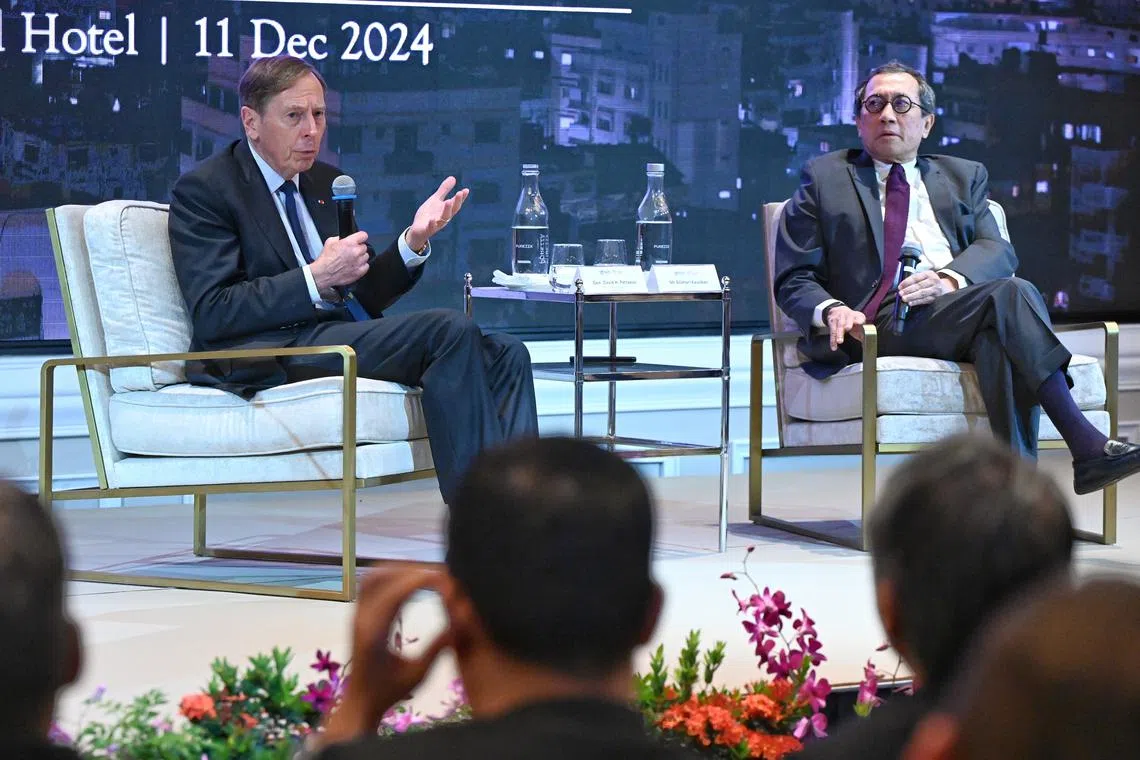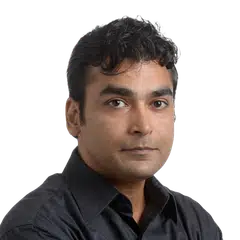Syria’s future hinges on ability of new rulers to unite country, says former top US general
Sign up now: Get ST's newsletters delivered to your inbox

Former US general David Petraeus (left) in conversation with Mr Bilahari Kausikan at the NUS Middle East Institute’s 2024 Roundup on Dec 11.
ST PHOTO: DESMOND WEE
Follow topic:
SINGAPORE – The future trajectory of Syria following the fall of the Assad regime
“What will happen now is an effort to bring everyone together,” said General David Petraeus in a conversation with former top diplomat Bilahari Kausikan at the NUS Middle East Institute’s (MEI) 2024 Round-up that took place at the Orchard Hotel on Dec 11.
“It depends very much on the ability of HTS leaders and those carry-overs from the Syrian government that are working with them now to bring everybody together that they possibly can under the umbrella of this new government, so that you don’t end up with a new civil war between the different factions that are in Syria,” he said.
He was referring to the Hayat Tahrir al-Sham (HTS), the leading rebel faction that deposed the Syrian government of President Bashar al-Assad – which had ruled the country for 24 years – on Dec 8 after a lightning offensive that swept into Damascus
He said that besides the HTS, other key factions in Syria are the Turkish-supported Free Syrian Army in the north and the Syrian Democratic Forces, which mainly comprise Syrian Kurds.
“They need to stay to keep an eye and pressure on the Islamic State. We learnt the hard way that if you don’t do that, forces like that can reconstitute. That’s how the Islamic State was able to rebuild itself in the wake of the withdrawal of US combat forces in late 2011,” he said, referring to ISIS.
“As we encountered in the wake of the toppling of the Saddam Hussein regime, if a country is left without overall leadership and order on the streets, terrible looting will set in, which could be as damaging or even more damaging than the war has been so far,” said Gen Petraeus, 72, who led the 2007 troop surge in Iraq and served from 2010 to 2011 as commander of US and Nato forces in Afghanistan.
Gen Petraeus noted that there are many ethnic groups and many sectarian groups in Syria. Even within the Shi’ites or the Sunnis, there are divisions.
He expressed hope that the rebel army now in control of Syria would avoid the “kind of very seriously misguided decisions” that were made by the Coalition Provisional Authority in Iraq, which sacked the entire Iraqi military without telling soldiers how the US was going to provide for them and for their families.
He added that this mistake had been compounded by the sacking of Saddam’s Ba’ath party, the upper echelons of which clearly needed to be killed or captured, according to the general.
“But when you include level four (government officials), you actually include the bureaucrats in the order of tens of thousands that we needed to help run a country that we didn’t sufficiently understand,” said Gen Petraeus, who also served as director of the Central Intelligence Agency.
“It was a huge blow,” he added.
The general said it is revealing that US Secretary of State Antony Blinken has been in communication with Gulf states and others in the region, including Israel, discussing how all of them might influence the emerging situation.
He said that the goal is to ensure that the HTS is “as inclusive and as secular and not Islamist as is absolutely possible”.
Noting that US President-elect Donald Trump has already warned against the US getting involved
“The first is, in the Middle East, never lose sight of who your enemies are and who your friends are, and Iran is our implacable enemy, two of whose goals are to destroy Israel and to destroy the US presence in the Gulf region,” he said.
“Truth No. 2”, according to the general, is that the US has to keep in mind that the Las Vegas saying, “whatever happens in Vegas, stays in Vegas”, does not apply in the Middle East.
He said that incidents in the Middle East tend to spew violence, extremism and instability, and in many cases, a tsunami of refugees, some of them seeking refuge in Europe, where some of the US’ most important allies are located.
“And then No. 3 is the operative one here, and that is that you have to recognise that the US trying to leave the Middle East is like Michael Corleone trying to leave the mafia and just getting sucked back in,” said the general to laughter from the audience as he referred to the fictional mafia don.
“The fact is, I think the US will be seeking to influence this in various ways, and, in some cases, we’ll do it through others.”
On the Gaza conflict, the general lauded Israel’s success in degrading the capabilities of Hamas but cautioned that the Palestinian militant group has not been destroyed.
He said that while Israel has stated the objectives of its war as the destruction of Hamas, the prevention of Hamas from governing Gaza again, and the return of hostages taken by the terror group, there needs to be another objective – to provide a better life for the Palestinian people in Gaza.
“And the only way to accomplish this is to achieve security,” said Gen Petraeus.
He said the way to achieve security in Gaza would be to create what are known as “gated communities” in the world of counter-insurgency, where a wall is literally built to separate the territory into distinct parts.
Once three such walls are established in the small Gaza territory, they can then be painstakingly cleared of all Hamas elements, said the general. Simultaneously, biometric ID cards should be issued to those who belong there.
This would enable the provision of better shelter and humanitarian assistance, besides the restoration of basic services and reconstruction in Gaza, said Gen Petraeus.
“But only Israel can do this. Palestinian forces will not do this. Arab armies, Arab forces will not do this... And until you achieve security, you really can’t achieve that objective (a better life for Palestinians) that I believe is necessary to achieve as well,” he said.
During his conversation with Mr Kausikan, an honorary MEI fellow, Gen Petraeus also shared his observations on how the Gulf is changing.
He said that he is keenly aware of efforts in the Gulf states, as well as Egypt and Jordan, to develop the technologies of the future and parts of the economy that are not strictly based on fossil fuels.
“It’s really quite dramatic. You see the education that’s going on. You see the secular approach to this, allowing those of other faiths and so forth. And it’s really quite dramatic in some cases and in some places, in cases, it’s actually downright breathtaking,” said the retired general, who nowadays is a partner at investment firm KKR and chairman of the KKR Global Institute.


